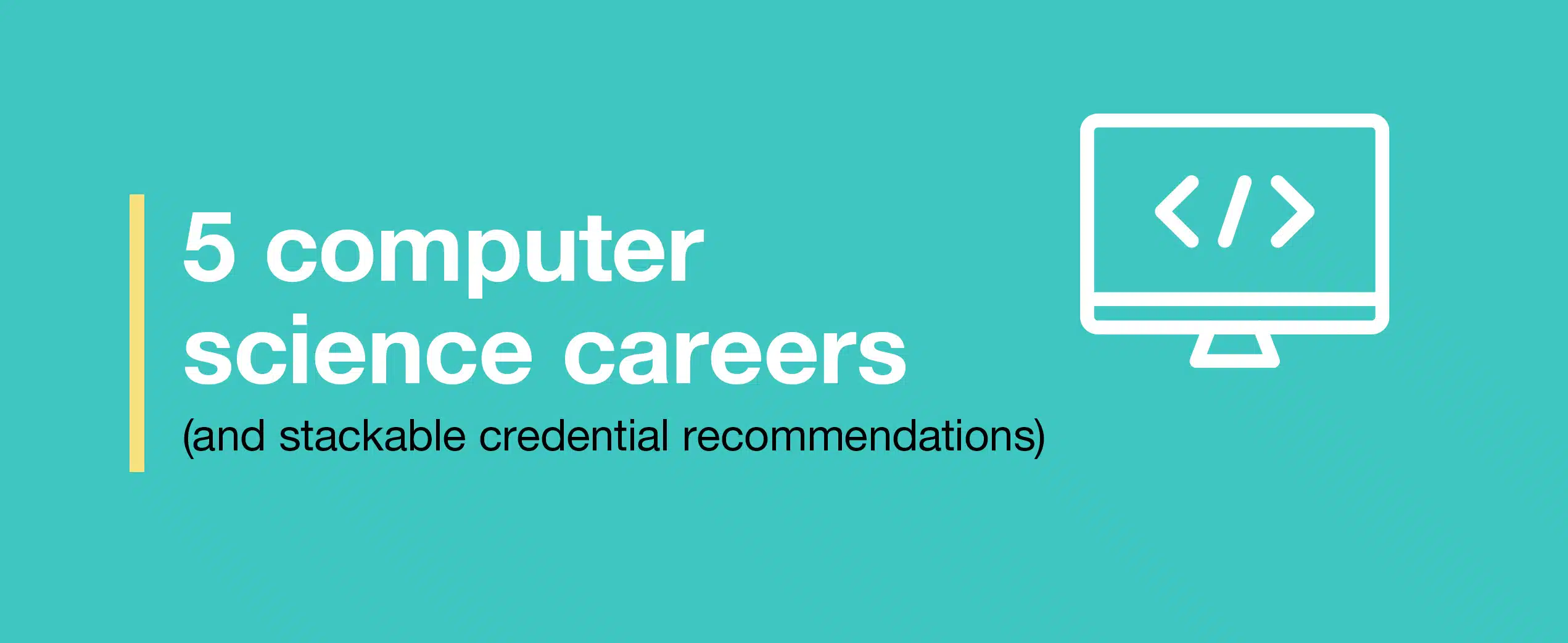Did you know computer science careers and information technology (IT) are expected to grow 13% from 2020 to 2030? Computer and IT careers are growing at a faster rate than all occupations on average according to the US Bureau of Labor Statistics (BLS). With that kind of growth, it’s the perfect time to start exploring computer science careers.
In this blog, I break down five computer science careers to expand your knowledge about this diverse field. Because there are many more opportunities than just developing software, coding and computer programming. Computer scientists impact every industry with their knowledge and expertise.
I share what you might experience working in the field, what career interests align with each path and what the trends are in each field. And I show you how each career relates to your YouScience Discovery results.
Ask your teacher if your school has access to Precision Exams by YouScience. In this blog, I also recommend a path to earn stackable credentials with industry-recognized certifications. The US Department of Labor defines stackable credentials as “part of a sequence of credentials that can be accumulated over time and move an individual along a career pathway or up a career ladder.”
This means you can earn multiple certifications to build (or “stack”) your knowledge and skills towards your desired career — even across Career Clusters. These certifications can help you get ahead of the competition by showing proof you have the skills to pay the bills.
- Information security analyst
- Statistician
- Informatics nursing assistant
- Multimedia artist/animator
- GIS technician
Computer science career #1 – information security analyst
As the digital age continues to evolve, companies need people at the helm who can keep their businesses safe from threats. And an information security analyst does just that.
Picture yourself as the front line of defense for a company. You fight against cyber-attacks, systems or network compromise, malware attacks and internal misuse. As an information systems analyst, you plan, implement, upgrade, test and monitor security measures to keep a company protected.
But you won’t be stuck behind a desk all the time. You may have opportunities to travel to client locations, offer trainings to employees and attend conferences and professional development sessions.
Is this career right for me?
Let’s dive into your YouScience Discovery results to see if you have what it takes to become a cyber superhero.
Knowing your aptitudes is powerful when planning for your future career. It helps you understand the things you were born to do well and will find satisfaction in doing every day. It shows you where a career might be too challenging or not stimulating enough for you. That’s why you should start by seeing how your aptitudes align with a career as an information security analyst.
For example, inductive reasoning — or the ability to create conclusions from information — is a critical aptitude for this career. Diagnostic problem solvers (people with a high aptitude for inductive reasoning) will enjoy using their ability to notice flaws quickly and make accurate conclusions and observations.
Now, look at the type of work that interests you in your Discovery results. According to data from O*Net, becoming an information security analyst is perfect if you have an interest in activities that are:
- Conventional
You’ll develop clear policies and procedures for an organization to follow to keep systems safe and help employees understand the importance of compliance. Your work will ensure the safety of, not only the company, but its employees and customers too. - Investigative
Love troubleshooting? You’re in luck — information security analysts frequently work to identify solutions to issues with technology, applications and systems. There’s ample opportunity to dive into data to better understand a company’s networks and systems. - Realistic
Information security analysts are focused on practical, hands-on problems and solutions for issues that impact a company’s productivity. After all, if an employee can’t access their email due to a phishing attack, how will they be able to work?
See how your aptitudes and interests align with a career as an information security analyst by taking YouScience Discovery.
How do I get there?
Most information security analysts have a bachelor’s degree in a field related to computer science. However, other disciplines that rely on critical and analytical thinking, such as business or telecommunications, are relevant too.
It’s increasingly common for individuals to pursue master’s degrees or post-graduate certificates in information assurance or security. And broader master’s degrees can also be valuable in this career. In fact, some employers prefer applicants who have a Master of Business Administration (MBA) in information systems.
Job trends
What’s the outlook for information security analysts? O*Net Online projects faster than average growth (15% or higher).
- Median wage (2020): $103,590 annually
- Projected job openings (2020–2030): 16,300
Build it with stackable credentials
Many information security analysts will pursue the following certifications:
- Certified Information Systems Security Professional
- Certified Information Security Manager
- Certified Information Systems Auditor
- Certified Authorization Professional
- CompTIA Security+
Does your school use Precision Exams by YouScience? If so, you can start building foundational knowledge and skills now to succeed as an information security analyst in the future. Click the name of the certification exam to review the standards. Then, talk to your school counselor about what classes offer them:
- Cloud Computing I: This exam is in the pilot phase for the 2021-22 school year. However, it provides you with opportunities to build the necessary skills to ensure a company’s global infrastructure remains secure. After all, remote work won’t go away any time soon. (Prerequisites: Computer Science Principles, Information Technology Fundamentals)
- Business Communication I: Passing this certification exam gives you tangible proof of your skills in oral, written, interpersonal, technological and employment communication. You are better prepared to lead trainings and create better relationships with your employer, coworkers, clients and beyond.
- Network Fundamentals: When you earn this certification, potential employers know that you have knowledge and skills in building, installing, configuring, maintaining and troubleshooting network technologies. Plus, you get an introduction to network security, including learning how to install a basic firewall.
Computer science career #2 – statistician
Love data and mathematics? You can unite them into one career as a statistician.
From government and manufacturing to education and marketing, statisticians are found in a wide variety of working environments. In this role, you conduct computer and information research and use mathematical techniques to analyze and interpret data and draw conclusions.
You may have opportunities to design surveys, experiments and opinion polls to collect data, identify patterns and summarize your findings for a broad audience.
Is this career right for me?
This unexpected computer science career could be your best-fit future! Open your Discovery results to see how your aptitudes and interest align with a statistician.
Pay close attention to your aptitudes. One aptitude critical for statisticians is sequential reasoning — or the ability to organize information in your mind. Sequential thinkers (people with a high aptitude for sequential reasoning) will enjoy organizing structures, systems and schedules to optimize the delivery of their findings.
Now, look at the type of work that interests you in your Discovery results. According to data from O*Net, working as a statistician is perfect for someone interested in careers that are:
- Conventional
Data is the name of the game for this career. And you lead the charge by clearly defining the scope of each project, including deciding what data is needed and how to collect it. You also help others understand the limitations of the data to ensure accurate interpretation. - Investigative
You can start calling yourself Sherlock now, because statisticians are essentially data sleuths. In this career, you find trends, examine theories and develop conclusions to share with a broader audience.
See how your aptitudes and interests align with a career as a statistician by taking YouScience Discovery.
How do I get there?
Start signing up for mathematics classes now because you’re going to need them! Requirements for statisticians aren’t standard across industries, but you probably want a bachelor’s degree in mathematics or statistics with significant coursework in mathematics.
However, many employers now look for candidates with master’s or doctoral degrees — even for entry-level positions.
Job trends
What’s the outlook for statisticians? O*Net Online projects faster than average growth (15% or higher).
- Median wage (2020): $92,270 annually
- Projected job openings (2020–2030): 5,000
Build it with stackable credentials
While not many statisticians pursue certifications, some seek accreditation from the American Statistical Association to verify their knowledge and competency.
Eager to start on your path towards becoming a statistician? Take these Precision Exams by YouScience certification exam standards to your school counselor to find out which classes offer them:
- Computer Science Principles: You gain a solid foundation in the computer science field and the types of related roles you’ll interface with. Earning this certification proves you can design and evaluate problems by developing algorithms and programs — a key component of your future career as a statistician.
- Business Communication II: Communication skills are key. When you pass this certification exam, you show employers you can design and lead oral presentations, develop business reports, and more. Your class also may offer the opportunity to start building your own employment portfolio — job application, cover letter, resume, reference sheet and follow-up letter. (Prerequisite: Business Communication I)
- Economics: Although an economist is different than a statistician, a firm understanding of economics can go a long way. Particularly if you want to pursue the government or health industries. It proves you have an awareness and understanding of the changing global economy.
Computer science career #3 – informatics nursing assistant
You may think to yourself, “what in the world is an informatics nursing assistant?” I know I did. What it is, is the perfect combination of nursing, computer and information sciences where you drive improvements in patient care outcomes.
Yeah, it’s an important job.
One where you use technology daily to monitor systems, analyze patient care initiatives and identify ways to improve and implement changes. You also have a lot of opportunities for social interactions. You help the nursing staff understand the importance of your systems and your developers understand the nursing staff’s needs.
Is this career right for me?
If this sounds like an interesting career path to you, log into your Discovery results to see how your aptitudes and interests align with an informatics nursing assistant.
Numerical reasoning — or the ability to see numerical relationships — is crucial aptitude for success as an informatics nursing assistant. Numerical detectives (people with a high aptitude for numerical reasoning) will enjoy exercising their skills in translating information into numbers to process
Once you’ve reviewed your aptitudes, look at the type of work that interests you in your Discovery results. According to data from O*Net, a career as an informatics nursing assistant is right if you’re interested in careers that are:
- Social
While you won’t deal with patients hands-on, your career as an informatics nursing assistant is filled with opportunities to work with others. You serve as a core communicator in your organization, help to ensure compliance, analyze and interpret data, and keep systems running. - Investigative
You need a solutions-first mindset for this career. Healthcare is a rapidly changing field. Youneed to explore emerging trends, examine current practices and develop methods to stop problems before they become a real
See how your aptitudes and interests align with a career as an informatics nursing assistant by taking YouScience Discovery.
How do I get there?
A bachelor’s degree is required to become an informatics nursing assistant — one with a focus in computer and information systems.
You may also want to consider pursuing a master’s degree. Because you bridge the gap between healthcare providers and the technology behind the scenes, consider pursuing a computer science degree with coursework in health management.
Job trends
What’s the outlook for informatics nursing assistants? O*Net Online projects average growth (5-10%).
- Median wage (2020): $93,730 annually
- Projected job openings (2020–2030): 47,500
Build it with stackable credentials
Some informatics nursing assistants show their industry competency by getting an Informatics Nursing Certification (RN-BC®) from the American Nurses Credentialing Center. But, it’s not required.
Want to start building these skills at your school? Check out these Precision Exams by YouScience certification exam standards. Then, set a meeting with your school counselor to create your schedule with classes that offer them:
- Nursing Assistant: You need a baseline understanding of the current systems at work. This certificate shows you have a broader understanding of nursing services, including hands-on experience with basic nursing skills. It also shows you see the bigger picture when it comes to medical and professional ethics.
- Computer Technology II: Earning this certificate proves your knowledge and skills in document editing, spreadsheets, electronic presentations and even databases. Talk about a gold mine for a budding informatics nursing assistant! (Prerequisite: Computer Technology I)
- 21st Century Success Skills: Did you know employers are increasingly focused on applicants who have the soft skills? That’s why getting this certification can go a long way. It shows you can research, reason, relate to others and deliver results.
Computer science career #4 – multimedia artist/animator
Multimedia artists and animators sit at the intersection of art and computer science.
From video games to movies and television, this career is essential to the entertainment industry. I’m sure you’d like to do it all, but most multimedia artists and animators specialize in a specific medium.
Your path may focus on computer-generated images (or CGI) to design scenery for the next Lord of the Rings series. Or you might decide to focus on animation to develop the next Mario Party game.
Is this career right for me?
Explore YouScience Discovery to see how your results align with a career as a multimedia artist and animator.
As you might imagine, spatial visualization — or the ability to think visually — is an important aptitude for this career path. 3D visualizers (people with a high aptitude for spatial visualization) will enjoy flexing their ability to build, manipulate and reorganize objects to effectively fit any project’s parameters.
Review the type of work that interests you in your Discovery results. According to data from O*Net, life as a multimedia artist and animator is perfect for someone with interests in:
- Artistic
In this role, you constantly use your creative brain to design two- and three-dimensional models and animations. One loved by millions of people around the world. Imagine that! - Investigative
It’s not all sunshine and rainbows in this career. You have problems to solve to ensure your designs function properly. And, depending on your project, you may have a lot of research ahead of you to determine the best design.
See how your aptitudes and interests align with a career as a multimedia artist and animator by taking YouScience Discovery.
How do I get there?
Multimedia artists and animators have a variety of education pathways to choose from.
Employers might require a bachelor’s degree in computer graphics, art or a related field, but not always. A strong portfolio of work that showcases your design and technical skills could be all you need to get hired.
Job trends
What’s the outlook for multimedia artists and animators? O*Net Online projects faster than average growth (15% or higher).
- Median wage (2020): $77,700 annually
- Projected job openings (2020–2030): 7,800
Build it with Stackable Credentials
Certifications aren’t required for multimedia artists and animators. But that doesn’t mean certifications can’t help you get ahead by validating your skills to potential employers.
You can start building your knowledge, skills and portfolio right now in your school with Precision Exams by YouScience. Review these certification exam standards and ask your counselor which classes offer them:
- Digital Media II: Earning this certificate proves you have advanced knowledge of design planning and creating interactive projects using text, 2D and 3D graphics, animation, sound, video, digital imaging and more. (Prerequisites: Digital Media IA, Digital Media IB)
- 3D Animation: Jumpstart your animation skills by earning this certification. You gain a baseline knowledge of 2D and 3D animation and prove skills in everything from storyboarding to animation.
- Entrepreneurship: If you’re thinking about freelancing in this career, earning this certificate proves your understanding of the marketing and management principles needed to start and operate your own business. And it shows you have mastery of economic and financial concepts and the ownership, government and legal regulations you may need to follow.
Computer science career #5 – GIS technician
Thanks to geographic information systems (GIS), comprehensive mapping technology lets us see our world differently. And GIS technicians are the ones who make that happen.
GIS techs use specialized technology to digitally assemble, integrate and display data about a particular location. In this role, you compile information from a variety of sources to help scientists, technologists and other professionals to build, maintain, modify or use GIS databases.
You may have the opportunity to help create maps to support environmental studies, geology, engineering, land-use planning and even marketing businesses. You may also help surveyors and cartographers collect data and make maps of the Earth’s surface.
Is this career right for me?
Let’s hop back into your Discovery results to see how your talents align with a future as a GIS technician.
How does your visual comparison speed — or ability to notice details — rank? Visual scanners (people with a high aptitude for visual comparison speed) will love using this talent to read and interpret large amounts of data.
Now, review the type of work that interests you in your Discovery results. According to data from O*Net, becoming a GIS technician might be for you if you’re interested in careers that are:
- Investigative
As a technical expert, you oversee the maintenance of GIS databases to ensure they remain up to date. This enables you to conduct analyses to address scientific problems. This career may involve frequent meetings with clients to explore technical specifications, customized solutions or operational problems. - Realistic
It doesn’t get more real than this. You create visual representations of geospatial data, interpret aerial or ortho photographs. And you support the research, data analysis and systems designs of GPS software. - Conventional
This is another computer science career where data is the name of the game. From creating and updating databases to analyzing data for trends or relationships among variables, it is important to follow consistent procedures.
See how your aptitudes and interests align with a career as a GIS technician by taking YouScience Discovery.
How do I get there?
There are entry-level technician positions that only require a high school diploma. But most GIS technicians need a bachelor’s degree in cartography, geography, geomatics, computer science, engineering or a related field. Some employers will also consider candidates with associate degrees and two or more years of experience with GIS systems.
Job trends
What’s the outlook for GIS technicians? O*Net Online projects average growth (5-10%).
- Median wage (2020): $92,870 annually
- Projected job openings (2020–2030): 37,500
Build it with stackable credentials
Certifications aren’t required for GIS techs. However, many will pursue a Technologist certification from the American Society for Photogrammetry and Remote Sensing or a GIS Professional certification from the GIS Certification Institute.
To start building towards this career now, explore these Precision Exams by YouScience certification exam standards and add classes that offer them to your schedule:
- Information Technology Fundamentals: As a prerequisite for many of the more advanced computer science certifications, this is not one to skip. You gain knowledge about current issues and careers in the IT world. And you build skills in digital media, hardware and operating systems, communications and networks, software development and databases.
- Database Development: Database administration is a key part of this career. Passing this exam proves to employers you have a deep understanding of database concepts. And you know how to best structure data and how to create database objects, manipulate data and construct queries. All essential skills you need as a GIS tech!
- Digital Graphic Arts I: When you earn this certification, you validate your understanding of design processes, typography, digital illustrations and image rasterization, as well as basic computer skills. They’re essential skills to help you create models and visual elements to interpret data for others.
These are only five of endless career opportunities in computer science. What do you think? Are you considering any computer science careers for your future plan?
To find out whether your aptitude for spatial visualization makes you the next Tony Stark, or another job that will make you just as successful, try YouScience Aptitude & Career Discovery for yourself.
Talk to us how YouScience Brightpath is revolutionizing how individuals, education, and industries connect and succeed.











